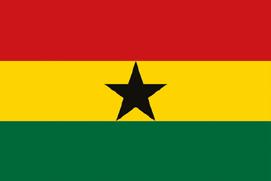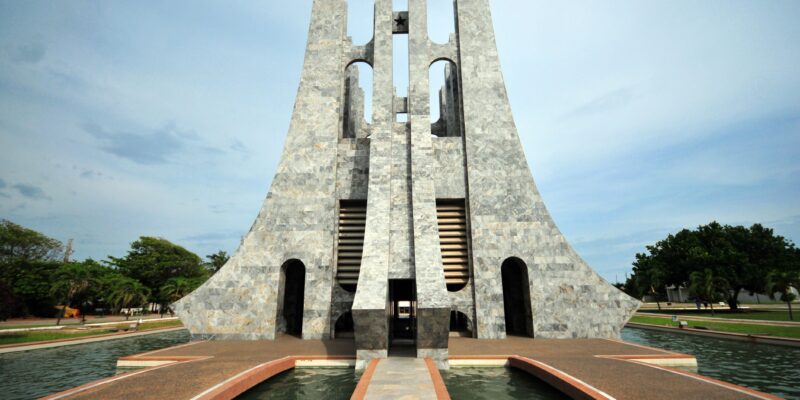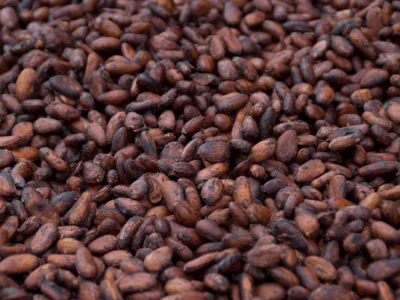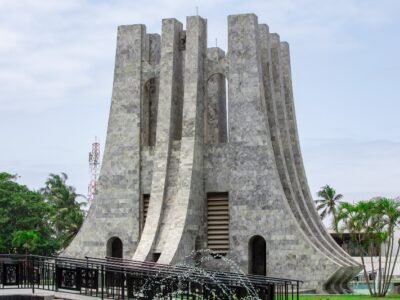
At independence, Ghana’s first president, Dr Kwame Nkrumah included a black star in the national flag, an indication of the role that the first self-governing African country expected to play in the continent. The country took its first steps in triumph and optimism, buoyed by the abundance of mineral and natural resources that it was believed would power its ambitions as a free country. Like many other countries in Africa, however, the 60s and 70s were rife with political instability and economic stagnation. After a painful drought and food shortages in the early 80s, the country accepted the need for a structural transformation and embarked on a raft of reforms to make its economy more market-friendly and amenable to privatesector investment and participation. The country had reasonable success in its reform agenda and was often held up as a leading light on the continent, culminating in its reclassification as a lower middle income country in 2010. That year also saw the commencement of commercial oil production, which quickly became a leading source of investment, jobs and revenue for the national treasury.
Ghana has become an increasingly attractive destination for foreign investment in recent years. With a stable political environment, a diversified economy, including a vibrant private sector, and a strategic geographic location, it is consistently ranked among the top 10 countries in Africa for
ease of doing business by the World Bank. The government of Ghana has implemented several policies to attract foreign investment, including the establishment of the Ghana Investment Promotion Center (GIPC) to facilitate investment processes and provide assistance to investors. Additionally, Ghana is a member of several trade blocs, including the Economic Community of West African States and the African Continental Free Trade Area (AfCFTA), providing access to neighbouring and Africa-wide markets. With a growing middle class, skilled workforce, abundant natural resources, and a supportive investment climate, Ghana presents an exciting prospect for investors looking to tap into emerging opportunities in Africa.
Ghana has emerged as one of the African countries preferred by investors. The government has prioritised the development of key sectors such as agriculture, manufacturing, and infrastructure, creating openings for both local and foreign investors. The country’s agriculture sector, for example, with its vast arable land and abundant water resources, has enormous potential for growth. The manufacturing sector is also poised for expansion, as the government seeks to promote value-added industries and increase exports.
The government has turned its ambition to industrialisation to complement a boom in services, to reduce the dependence on natural resources and vulnerability to global price shocks that have frequently disrupted its economy. While the country has struggled with recent upheavals created by Covid-19, conflict in Europe, high inflation and debt crises, the government is determined to utilise such challenges to build more permanent structures that would secure the country in the event of future global ruptures.

Ghana is noted for its warm, friendly people and diverse society, consisting of at least 70 different ethnic groups and 49 languages. The most recent census in 2020 counted 30.8 million people, with the population growing at an average of 2.1 per cent a year. The majority of the population is youthful, with around 57 per cent being under the age of 25. Christianity and Islam are the two most dominant religions in Ghana, accounting for 71 per cent
and 17 per cent of the population respectively. Access to education is on the rise due to the government’s policy of providing free education up to senior secondary level, which is expected to further enhance the quality of the country’s workforce. The government continues to invest in social services and infrastructure to improve the quality of life for its citizens.
Ghana has a robust multi-party democracy with human rights and free speech guaranteed to its citizens. Since 1993 when it returned to constitutional rule, the country has held 8 successful elections, three of which ended with a transition to governments formed by the opposition. There are two major parties, both of which are committed to enhancing the country’s competitiveness, its attractiveness to private investors and the security of investment ventures. The capital
city, Accra, is also the economic centre and hosts the majority of business activity in the country. In 2020, Accra was chosen as the city where the secretariat of the African Continental Free Trade Area would be located.
THE GOING GETS TOUGH FOR THE ECONOMY
Ghana’s economic growth was disrupted by the onset of the Covid-19 global pandemic in 2020. In 2019, the country had grown by 6.5 per

cent. As the pandemic raged, the government moved to shut down swathes of the economy to prevent infections and protect lives. At the same time, it stepped up social interventions such as subsidies for water and electricity consumers. The increased spending, slowing economy and reduced revenue intake exerted a predictable toll on the nation’s finances and accelerated its exposure to debt. Further shocks from the heightened inflation in 2022, interest rate hikes and the supply chain shocks resulting from the pandemic combined with the war in Ukraine to put the Ghanaian economy under more pressure. In December 2022, Ghana defaulted on its debts to international creditors.
Six months before that, the country had applied for an International Monetary Fund support package. Negotiations began in September and proceeded swiftly, culminat-
ing in a staff-level agreement in December 2022 and full board approval in May 2023. Prior to that, the government successfully concluded a domestic debt exchange programme and gained similar assurances from its international creditors. Under the IMF package, the government is expected to embark on a raft of measures to enhance public financial management and other long-term, sustainable reforms to the country’s fiscal and monetary policies, which include making renewed efforts to improve domestic revenue generation and block tax loopholes. The government is determined to use this moment of crisis to undertake the changes that will set Ghana on the path to sustainable recovery and growth. In addition to the overhaul of its fiscal approach, it hopes to attract more investors –from home and abroad – to take advantage of the many opportunities, the friendly business environment and its targeted policies to support enhanced local production and a diversified economy.
FROM EXPLOITATION TO PRODUCTION
Ghana’s exports have typically been heavily tilted to raw materials. From gold, oil and cocoa through to timber and agricultural produce, the majority of its exports have been in their raw state. On the other hand, the country imports most of the finished products that are used in the country. The government’s strategy to support local production, add value to natural resources and reduce imports includes tax incentives, special economic zones and the provision of critical infrastructure to support production. Under the One District One Factory policy, investors are able to access concessionary lending from local financial institutions covered by a government guarantee, while local communities are encouraged to support investors with land and other resources. Currently, the majority of these factories are agro-based, a boost to the government’s hopes that agro-
processing can be the springboard for the country’s industrialisation. The government also has a programme to build warehouses around the country to support local producers; these facilities will be especially critical for agricultural suppliers, who have had challenges with storage in the past. An improved road network connecting farms with urban communities is also helping to make the marketing of agricultural produce easier, less risky and more cost-efficient. Another growing sector is automobile manufacturing, which government has sought to facilitate through the Ghana Automotive Development Policy, launched in 2020. Since then, global brands such as VW, Nissan, Suzuki, Peugeot and Hyundai have established assembly plants in the country. The Association of African Automobile Manufacturers projects that as many as 1.5 million cars could be assembled in Ghana by the end of 2023. The government is seeking to support the sector with tax exemptions such as zero rating of VAT on the sale of domestically assembled vehicles and an asset-based vehicle financing scheme to stimulate demand for these.
AT THE CENTRE OF AFRICAN TRADE
On 1 January, 2021, the African Continental Free Trade Area (AfCFTA) came into effect. The purpose is to remove trade and customs barriers between all African states, in the process creating a single market that will be the largest in the world when fully implemented. The value of the market is estimated at $3.4 trillion, with a reach of 1.3 billion people across Africa’s 55 countries. The free trade area will also eliminate variations in regulations and enable companies to build a market presence in the continent from any single country, based on a single set of rules. It is expected that this will lead to the development of regional value chains, where countries specialise in certain goods and services, leading to increased efficiency and productivity.
Ghana has been chosen to host the headquarters of the secretariat and the government is determined to reap the full benefits from this long-awaited opportunity. Ghana has already participated in trade under the agreement, receiving batteries and tea from Kenya and coffee from Rwanda. On its part, Ghana has also exported cocoa powder, rubber, palm oil and live plants such as mushroom spawn to Kenya, and ceramics to Cameroon. The government has assisted 30 companies to gain the needed certification to export goods under the rules of the AfCFTA. As one of the first seven countries to be selected for the pilot, Ghana is well positioned to provide a crucial entry point to global brands that want to access the opportunities in the wider African market.

EVERY GHANAIAN LIVING EVERYWHERE
Ghana is determined to make use of the skills and capital of its large diaspora to help drive its development ambitions. The first homecoming summit in 2001 was a declaration of this ambition and since then, the country has moved to create a welcoming environment not only for Ghanaians living abroad, but also the black diaspora who can trace their ancestry to the country. Among other things, Ghana has offered visa-free travel and citizenship to interested members of the black diaspora. Some local chiefs have gone further to provide land to those looking to settle or invest. These initiatives stem from a conviction that the black star of Africa should remain a beacon for the sons and daughters who have been abroad – whether for a year or several generations – and want to come back home to contribute to the continent’s renaissance. In 2019, an open invitation to come to Ghana and commemorate the 400th year since the first slave ships arrived in America drew over a million visitors. The government is looking to build on that success and create sustainable linkages with the global black diaspora to encourage investment and visits for leisure, such as the increasing trend for Ghanaians abroad and other tourists to spend December in the country.
REBIRTH OF A NATION
After 66 years of independence, Ghana has learned from its history and is poised to move to the next stage of development. A robust democracy that has endured for three decades and the sustained peace it enjoys make it a solid bet for local and foreign investment. While the challenges of the immediate past have tested its resolve, the country is set to emerge stronger and better able to leverage its human and natural resources to chart sustained progress. In the coming years, Ghana will reassert itself as an economic powerhouse in the region with a stable economy, vibrant local industry, techenabled service delivery and as always, a warm people ready to work with the rest of the world to build a more prosperous future for all.
FIVE REASONS TO INVEST IN GHANA
1. Stable Democratic Climate
• Ranked as the most stable political environment within the West African sub-region and eighth in Africa, Ghana has established democratic institutions and systems to ensure good governance and rule of law in the country –Africa Country Benchmark Report (ACBR, 2018)
• 2nd Best Judicial System in West Africa, measured by the rule of law – World Justice Project (WJP) Rule of Law Index 2021
• 1st in West Africa & 2nd in Africa for peacefulness (Global Peace Index 2021)
2. Ease of doing business
• Ranked one of the best places for doing business in West Africa according to the World Bank’s Ease of Doing Business Report 2020
• Best destination for investment in West Africa & 3rd on the continent (AT Kearney Global Services Location Index 2021)
• Most competitive economy in the West African sub-region and 11th in sub-Saharan Africa (World Economic Forum Global Competitiveness Index 2019)
• 1st FDI destination in West Africa & 4th in sub-Saharan Africa (EY Attractiveness Report, October 2018)
3. Accessibility
• Geographically closer than any other country to the centre of the earth. An average of 8 hours of flying time to Europe and the Americas (World Population Review (WPR))
• World-class airport (Kotoka International
Airport) adjudged the best airport in West Africa and the best in Africa for airport service quality, with the capacity to serve 2-5 million passengers per annum
• Home to one of West Africa’s largest ports – Tema Port, which is centrally located in West Africa and has been upgraded to handle 3.5 million TEUs
• Immediate access to the over-370m market size of the Economic Community of West African States (ECOWAS)
• Access to the African Continental Free Trade Area (AfCFTA) market of 1.3 billion people across Africa, with a combined Gross Domestic Product (GDP) of $3.4 trillion
4. Competitive and educated
• Availability of skilled and trainable labour
• One of the most competitive minimum wages in the West African subregion at GH¢14.88
• One of the highest literacy rates in the West African sub-region. The adult (15 years or older) literacy rate being 79% (World Bank Group)
5. Strong resource pool
• No. 1 gold-producing country in Africa
• 2nd largest cocoa producer in the world
• 3rd largest bauxite reserve in Africa, with an estimated reserve base of 500 million
• Over 6 billion tonnes of iron deposits and over 60 million tonnes of manganese
• Over 189,000 barrels of oil produced daily
• 8 trillion cubic feet of natural gas reserves
• 5 million hectares of arable land
• 4 million hectares of cultivable land & 228,792 hectares of irrigable land
• 560km of pristine coastline
Source: Ghana Investment Promotion Centre (GIPC) – https://www.gipc.gov.gh/
MACROECONOMIC OUTLOOK
The authorities have sought IMF support and reached a staff-level agreement (SLA) in December 2022. Ghana is seeking a three-year arrangement under the Extended Credit Facility (ECF) of about US$3 billion. With a view to restoring public debt sustainability, the authorities have announced a comprehensive debt restructuring, implemented a moratorium on external official bilateral and commercial debt repayments, requested debt treatment under the G20 Common Framework, and committed to an ambitious fiscal consolidation plan. They completed a domestic debt exchange (DDE) programme in February 2023. Growth is expected to decelerate further in 2023 as macroeconomic weaknesses and contractionary fiscal and monetary policies dampen aggregate demand. Growth is expected to slow further to 1.6 per cent in 2023 and remain muted in 2024, before returning toward its potential. Non-extractives growth is expected to be low compared to the Covid-19 pandemic and 2014 crisis periods, with agriculture affected by high input prices and a disease affecting cocoa trees. Extractives growth is expected to be robust thanks to new gold mines and a recovery in small-scale mining. Going forward, the authorities will need to complement their incipient macroeconomic stability programme with growth-enhancing structural reforms such as improving the business environment and promoting export competitiveness, transitioning to the digital economy to boost productivity, and investing in resilient public infrastructure to adapt to the impact of climate change. The outlook is challenging. Risks to the outlook include delays in external debt restructuring and the IMF programme, increased financial sector vulnerabilities, and the realisation of contingent energy sector liabilities. In the shorter term, poverty is expected to increase slightly, due to the cumulative effects of increases in electricity and water tariffs, rising food prices and an increase in VAT. The revised electricity tariffs could be less regressive and reduce poverty if a portion of the increased revenues were targeted to the poor in the form of cash transfers.
Source: World Bank http://documents.worldbank.org/curated/en/099907204122391347/IDU0e72b5e0b07a1d042650b9300cc751f35612d















Comments